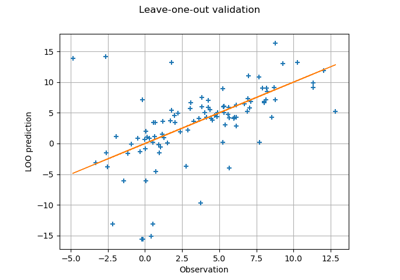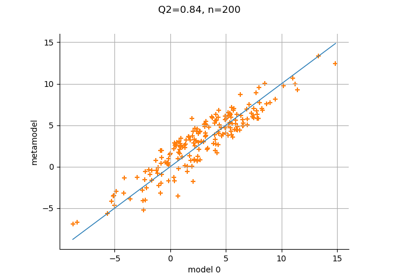KFoldSplitter¶
- class KFoldSplitter(*args)¶
K-fold splitter.
Generates train/test indices to split samples in train/test sets. The sample is split into k folds. Each fold is then used once as test while the k - 1 other folds form the training set.
- Parameters:
- Nint
Size of the set of indices in which the indices are chosen
- kint
Number of folds
Methods
Accessor to the object's name.
getN()Set size accessor.
getName()Accessor to the object's name.
getSize()Number of sets generated.
hasName()Test if the object is named.
setName(name)Accessor to the object's name.
setRandomize(randomize)Set the value of the randomize flag.
Examples
>>> import openturns as ot >>> sample = ot.Normal().getSample(10) >>> k = 5 >>> splitter = ot.KFoldSplitter(sample.getSize(), k) >>> for indicesTrain, indicesTest in splitter: ... sampleTrain, sampleTest = sample[indicesTrain], sample[indicesTest]
- __init__(*args)¶
- getClassName()¶
Accessor to the object’s name.
- Returns:
- class_namestr
The object class name (object.__class__.__name__).
- getN()¶
Set size accessor.
- Returns:
- Nint
Size of the set of indices in which the indices are chosen
- getName()¶
Accessor to the object’s name.
- Returns:
- namestr
The name of the object.
- getSize()¶
Number of sets generated.
- Returns:
- lengthint
Number of sets of indices generated.
- hasName()¶
Test if the object is named.
- Returns:
- hasNamebool
True if the name is not empty.
- setName(name)¶
Accessor to the object’s name.
- Parameters:
- namestr
The name of the object.
- setRandomize(randomize)¶
Set the value of the randomize flag.
Note that the default value is set via the ResourceMap entry KFoldSplitter-Randomize.
- Parameters:
- randomizebool
Scramble the folds.
Examples using the class¶

Compute leave-one-out error of a polynomial chaos expansion
 OpenTURNS
OpenTURNS
